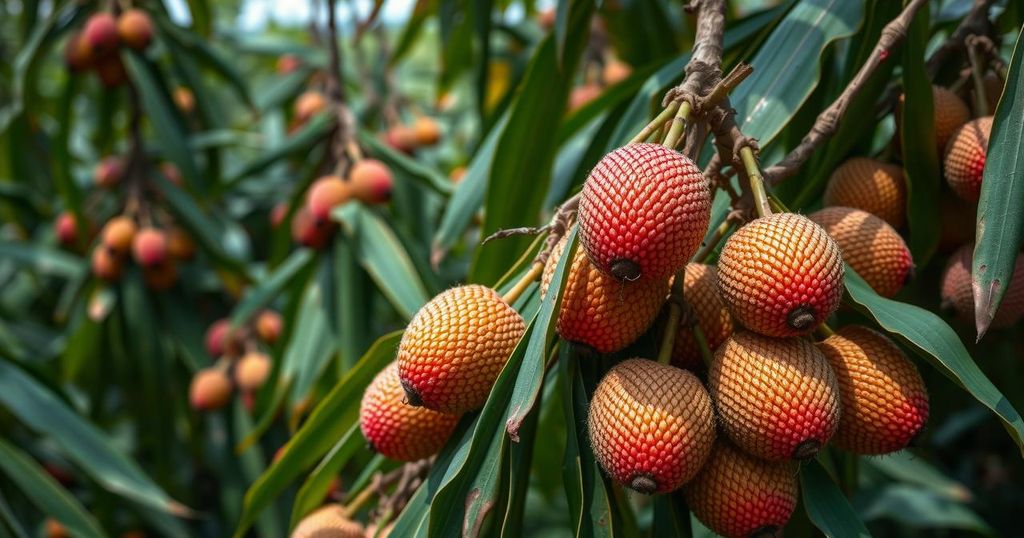Madagascar’s lychee farming faces a crisis as production forecasts reveal a significant decline due to excessive rainfall and early tree flowering. Industry leaders in Tamatave are seeking solutions to manage shortfalls while the economic consequences loom. Options include adjusting export quotas and sourcing from remote areas; however, logistical constraints complicate implementation. The situation underscores urgent needs for sustainable agricultural practices in the wake of unpredictable weather impacts.
Madagascar, the world’s leading producer of lychee, is currently facing a significant crisis as the harvest season begins. Despite the high demand for this prized pink fruit in European markets, projections indicate a dramatic decrease in production. The challenges stem from unusual factors, including an early flowering of lychee trees due to excessive rainfall and insufficient climate shocks, which are critical for proper growth. Growers and exporters in Tamatave are thus confronted with substantial economic implications. Judith Riccati, deputy executive director of the Tamatave Horticultural Technical Centre, attributes the decline to several climatic influences. The exceptionally high rainfall this year, measuring around 2,500 millimeters, disrupted typical plant development. Additionally, the required temperature drops for lychee trees were scarcely achieved, while older trees proved less resilient to the changing conditions. In light of these challenges, agricultural engineers are considering potential remedies, such as reducing export quotas or extending the harvest period by sourcing lychees from more distant regions. However, logistical constraints pose significant challenges to implementing these solutions. While discussions about extending loading times for shipment have been ongoing for over two decades, progress remains stalled, highlighting the need for immediate and sustainable strategies to address these agricultural challenges. As Madagascar grapples with unpredictable weather patterns affecting its agriculture fiercely, the urgency for effective adaptation strategies becomes increasingly pronounced. This crises not only threatens the livelihoods of local growers but could also impact the availability of lychee in key markets predominantly supplied by Madagascar.
Madagascar is renowned for being the primary producer of lychee, a fruit that holds significant appeal in European markets, particularly during the end-of-year holiday season. The horticultural sector is integral to the economy, providing employment and revenue for many local communities. However, this year, growers are faced with unprecedented challenges that may threaten both production and economic stability. The complex interplay of agricultural practices, climate conditions, and market dynamics adds layers of difficulty for the region’s lychee industry. Understanding these factors is crucial in exploring potential solutions to mitigate the crisis. As agricultural engineers seek out alternative practices to sustain production, the sustainability of such initiatives must be carefully considered in the context of evolving climate patterns and the historical performance of the lychee trees.
In summary, Madagascar’s lychee harvest faces a crisis due to a significant decline in production linked to adverse weather conditions, including high rainfall and insufficient temperature drops. As industry leaders confront these challenges, the exploration of solutions such as sourcing from remote areas highlights the necessity for adaptive strategies within agriculture. The imperative for sustainable practices becomes increasingly urgent as the economic stakes rise for local growers and exporters alike.
Original Source: www.rfi.fr






